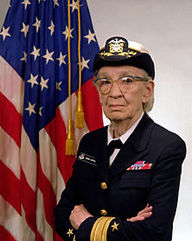English/Language Arts
Explore allusion
The title of this Minute offers a great opportunity to teach allusion, with its triple meaning pointing to the Christian hymn about an eye-opening, life-changing event, the guided missile cruiser USS Hopper, nicknamed Amazing Grace, and the fact that Grace Hopper, was, in fact, amazing. Use this Minute to introduce or reinforce the concept of allusions in writing.
Explore communication
Use this Minute to launch a class discussion about the nature and importance of language as a communication device. Grace Hopper’s work leading to the development of the computer language COBOL, represented a marked departure from prior communications in the computer world, which worked on machine, or assembly language. Her revolutionary idea of using English language to write computer instruction and then creating a translator, or compiler, to transform the instructions to a language the machine could understand, changed the direction and evolution of computers forever. Ask you students, how are you impacted by the ability to communicate with your digital devices in regular language? Have them think beyond to other things that are difficult to understand because of language or communication barriers. Brainstorm ideas to solve those communication gaps.
Explore word origins
Author Adkins tells the reader about the origin of the word “debug.” Word origins, or etymology can be a fascinating subject for students. For younger students, consider doing a read aloud of Andrew Clement’s Frindle, the story of a word making its way into the dictionary. For older students, introduce the Oxford English Dictionary (also available for online searching) and its long history of researching and sharing word origins. Considering sharing passages from Simon Winchester’s The Professor and the Madman: A Tale of Murder, Insanity, and the Making of the Oxford English Dictionary.
Social Studies
Explore WWII - Role of Women
WWII marked a decisive change for the role of women in the workforce in the US. Expand this Minute by sharing how women at all levels entered the workforce in WWII to replace men who were off fighting the war in manufacturing jobs. Did that change make Grace Hopper’s entrance into the academic needs of the war any easier?
Explore gender stereotypes
Continue the exploration of women in WWII by exploring the gender stereotypes that existed during this era. Did Grace Hopper fit the stereotypes of the time? How did she overcome? Do these stereotypes still exist? Can students find evidence to back their thinking? How do stereotypes come to be? How do we get rid of them? Are they always a bad thing? What can we learn from them?
Explore US Military
Use this Minute to explore the role of a military in war and peace time. What is the configuration of our military? What branches are in place? What do the ranks mean? Is it a viable career option in peace and in war?
STEM
Explore computer languages
Use this Minute as an introduction to computers. What are the parts and how do they work? Have students explore the different languages that currently exist and how computer languages have evolved and grown wince Grace Hopper’s contributions in the 1940s and 1950s. Can you see Hopper’s influence when you trace the evolution? Where do you think we are headed?
Research Skills
Explore computer coding sites
Use this Minute to get your students excited about coding. Check out the resources at Code.org and MIT’s Scratch and get them coding!
Explore allusion
The title of this Minute offers a great opportunity to teach allusion, with its triple meaning pointing to the Christian hymn about an eye-opening, life-changing event, the guided missile cruiser USS Hopper, nicknamed Amazing Grace, and the fact that Grace Hopper, was, in fact, amazing. Use this Minute to introduce or reinforce the concept of allusions in writing.
Explore communication
Use this Minute to launch a class discussion about the nature and importance of language as a communication device. Grace Hopper’s work leading to the development of the computer language COBOL, represented a marked departure from prior communications in the computer world, which worked on machine, or assembly language. Her revolutionary idea of using English language to write computer instruction and then creating a translator, or compiler, to transform the instructions to a language the machine could understand, changed the direction and evolution of computers forever. Ask you students, how are you impacted by the ability to communicate with your digital devices in regular language? Have them think beyond to other things that are difficult to understand because of language or communication barriers. Brainstorm ideas to solve those communication gaps.
Explore word origins
Author Adkins tells the reader about the origin of the word “debug.” Word origins, or etymology can be a fascinating subject for students. For younger students, consider doing a read aloud of Andrew Clement’s Frindle, the story of a word making its way into the dictionary. For older students, introduce the Oxford English Dictionary (also available for online searching) and its long history of researching and sharing word origins. Considering sharing passages from Simon Winchester’s The Professor and the Madman: A Tale of Murder, Insanity, and the Making of the Oxford English Dictionary.
Social Studies
Explore WWII - Role of Women
WWII marked a decisive change for the role of women in the workforce in the US. Expand this Minute by sharing how women at all levels entered the workforce in WWII to replace men who were off fighting the war in manufacturing jobs. Did that change make Grace Hopper’s entrance into the academic needs of the war any easier?
Explore gender stereotypes
Continue the exploration of women in WWII by exploring the gender stereotypes that existed during this era. Did Grace Hopper fit the stereotypes of the time? How did she overcome? Do these stereotypes still exist? Can students find evidence to back their thinking? How do stereotypes come to be? How do we get rid of them? Are they always a bad thing? What can we learn from them?
Explore US Military
Use this Minute to explore the role of a military in war and peace time. What is the configuration of our military? What branches are in place? What do the ranks mean? Is it a viable career option in peace and in war?
STEM
Explore computer languages
Use this Minute as an introduction to computers. What are the parts and how do they work? Have students explore the different languages that currently exist and how computer languages have evolved and grown wince Grace Hopper’s contributions in the 1940s and 1950s. Can you see Hopper’s influence when you trace the evolution? Where do you think we are headed?
Research Skills
Explore computer coding sites
Use this Minute to get your students excited about coding. Check out the resources at Code.org and MIT’s Scratch and get them coding!
© Karen Sterling, 2018 - May be used for educational purposes without written permission



